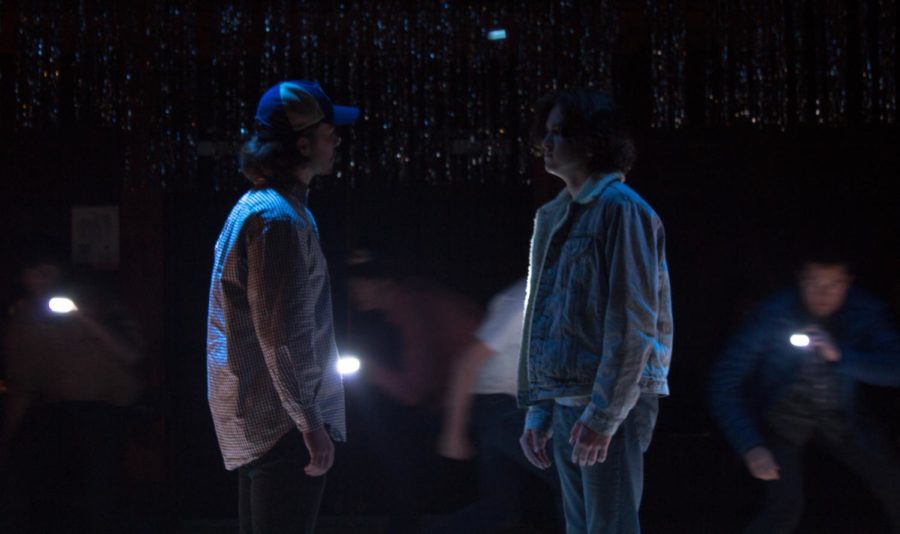10 thoughts I had while watching Urban’s production of Neutral Hero
Richard Maxwell’s Neutral Hero is described by student dramateur Zachary Ngin as a show that “defies summary. Most characters are nameless, most scenes placeless. It is difficult to say what it’s about, who wants what and why.” During Tuesday’s free preview of the performance, I kept Ngin’s words in mind as I watched the show for the first time. The following are some thoughts I had while watching a show that the assistant director and one of the actors Emma Draisin called both “a void of emotion, and an expression of emotion.”
- The show starts with a dance scene. The first thing I notice is the costumes: very casual! Some actors seem to be wearing the same thing they wore to school today. Also: a live band! That’s very cool.
- The chemistry between the cast feels very natural and I feel the romantic tension already. Ivy Musgrove (‘20) says the cast had to be “ more connected, and bonded” to pull off this kind of energy.
- I’m almost afraid I’ll be pulled in to dance because they are so good at making the audience feel included.
- Neutral Hero is a new experience for everyone in the show. Musgrove said, “I’ve only been in traditional plays, and it’s really cool to be doing something so different and out of my comfort zone.” That is clear from the start and I am already confused (in a good way).
- Right as I was starting to get into the dancing, the lights dim and the music stops, and the party turns into a play. Different cast members do monologues at different times, setting the scene and introducing the audience to the obstacles.
- During these monologues if, like me, you are watching the 4:30 showing and you haven’t eaten since lunch, you might be tempted to eat a snack. Make sure this is a quiet snack, and not Chex Mix, because everyone in the Gumption Theater will hear you chewing and you will probably be very embarrassed.
- The music is back! Thank god. Whether or not the songs are the best part is definitely debatable. The whole cast sings in this show, which is very impressive. This also means that the entire cast is on stage the whole time. Avery Sarrail (‘20), who plays the grandmother, says that “rehearsals are exhausting” because unlike other plays she’s done, she is never offstage.
- The show touches on very real issues teenagers face like unrequited or forbidden love, sexual desires, and romantic tension. It also means the same students I sit in class with portray everything from rapists to enticing goddesses, which meant I had to separate the kids I see every day from the roles they play.
- The issues the main character faces with his parents may be a dramatic extreme, but they represent the problems all kids, especially teens, face with their parents as they grow up. Peyton Sarrail (‘18) said the show “highlights the fact that anyone can be a hero, an average person in the mundane world.”
- A consensus among the actors I interviewed was they none of them really understood what was happening the first few times, or even the final times, they rehearsed. It makes sense, then that the audience may be confused as well. Peyton said, “The story strips everything— you don’t know where you are or what time it is, you don’t know the character’s name.”
By the end of the show, I was just as confused as I had been when I walked in, but I felt like Urban had done a great job of representing the struggles of growing up in a world where nobody and everybody is a hero. Though I don’t know him personally, I think Richard Maxwell would be proud.


